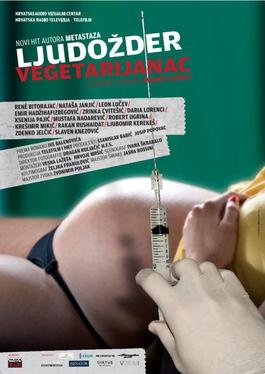Related Research Articles

Mira Furlan was a Yugoslav-American actress and singer. Internationally, she was best known for her roles as the Minbari Ambassador Delenn in the science fiction television series Babylon 5 (1993–1998), and as Danielle Rousseau in Lost (2004–2010), and also appeared in multiple award-winning films such as When Father Was Away on Business (1985) and The Abandoned (2010).

Rade Šerbedžija is a Croatian actor, director and musician. He is known for his portrayals of imposing figures on both sides of the law. He was one of the best known Yugoslav actors in the 1970s and 1980s. He is internationally known mainly for his role as Boris the Blade in Snatch (2000), his supporting roles in such Hollywood films as The Saint (1997), Mission: Impossible 2 (2000), X-Men: First Class (2011), Harry Potter and the Deathly Hallows: Part 1 (2010), and Taken 2 (2012); and for his recurring role as former Soviet Army General Dmitri Gredenko in Season 6 of TV action series 24.

Pula Film Festival is an annual Croatian film festival, established in 1954. It is held in a Roman amphitheater known as the Pula Arena. Pula Film Festival is the oldest Croatian film festival and is usually held in the summer, in July or August.

Dalibor Matanić is a Croatian filmmaker and screenwriter, known for raising pressing social issues in his films.
The Golden Arena awards were established in 1955 as the Yugoslav national film awards presented annually at the Pula Film Festival in Pula, Croatia, with the Big Golden Arena for Best Film its main prize. From 1955 to 1990 the awards were the Yugoslav cinema equivalent of the Academy Awards.
The Golden Arena for Best Director(Croatian: Zlatna arena za režiju) is an award given for best director at the Pula Film Festival, which was until 1992 the Yugoslav equivalent of the Academy Awards. Since 1992 and the breakup of Yugoslavia the competition narrowed to Croatian films only. The first festival was held in 1954, but the award was introduced in 1955.
The Golden Arena awards were established in 1955 as the Yugoslav national film awards, presented annually at the Pula Film Festival. From 1955 to 1990 the awards were given for highest achievements in Yugoslav cinema. In 1991 the festival was cancelled due to the breakup of Yugoslavia, only to resume in 1992 as the Croatian film awards festival. It has been held every year since.
The following is a list of winners of the Golden Arena for Best Actress at the Pula Film Festival.
The following is a list of winners of the Golden Arena for Best Screenplay at the Pula Film Festival.

Filip Robar Dorin was a Slovenian film director, screenwriter, and film editor.
Arsen Anton Ostojić is a Croatian film director and screenwriter.
Nevio Marasović is a Croatian film director, screenwriter, and a commercial director.
Mate Matišić is a Croatian playwright, screenwriter, composer and musician. His plays have been staged in Croatian theaters as well as internationally, and some of them have been adapted into feature films. As a composer, he is best known for his film and theatrical music. He has won five Golden Arena awards at the Pula Film Festival.

Vegetarian Cannibal is a 2012 Croatian drama film directed by Branko Schmidt. It was released on 1 March 2012 and stars Rene Bitorajac as an immoral doctor.
The Golden Arena for Best Supporting Actor is an annual award, given by the Pula-based cinema circle at the Pula Film Festival, to honour the actors who gave outstanding performances in a supporting role. The Golden Arena is considered the Balkan equivalent of the Academy Award.

The Diary of Diana B. is a 2019 biographical film directed by Dana Budisavljević. The film tells the story of the aid operation of humanitarian Diana Budisavljević for the rescue of more than 10,000 - mainly Orthodox Christian Serbs - children from concentration camps in the Independent State of Croatia during WWII. The film had its world premiere at the 2019 Pula Film Festival. It won four Golden Arenas, including the Big Golden Arena for Best Film.
References
- ↑ "A Journey Through the Dark Side (1996)". IMDb . Retrieved 20 March 2020.
- 1 2 3 Petković, Vladan (30 July 2012). "First-timer Čučić wins Grand Golden Arena for A Letter to My Father". Cineuropa. Retrieved March 20, 2020.
- 1 2 "AWARDS of the 60th Pula Film Festival". Pula Film Festival . 29 July 2013. Retrieved 20 March 2020.
- ↑ "61st Pula Film Festival Awards". Pula Film Festival . 26 July 2014. Retrieved 20 March 2020.
- ↑ "Awards of the 62nd Pula Film Festival". Pula Film Festival . 18 July 2017. Retrieved 20 March 2020.
- ↑ "Awards of the 63rd Pula Film Festival". Pula Film Festival . 18 July 2017. Retrieved 19 March 2020.
- 1 2 "Awards of the 64th Pula Film Festival". Pula Film Festival . 26 September 2017. Retrieved 19 March 2020.
- 1 2 "Awards of the 65th Pula Film Festival". Pula Film Festival . 21 July 2018. Retrieved 19 March 2020.
- 1 2 "Awards of the 66th Pula Film Festival". Pula Film Festival . 20 July 2019. Retrieved 19 March 2020.
- ↑ "Awards of the 67th Pula Film Festival". Pula Film Festival . 4 September 2020. Archived from the original on 26 October 2020. Retrieved 6 September 2020.